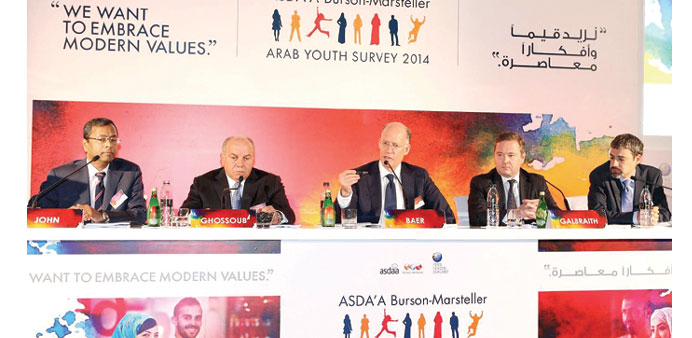Don Baer, worldwide chair and CEO of Burson-Marsteller and CEO of PSB (centre), addressing a press conference.
Agencies/Dubai
Even as young people across the Arab world embrace modernity as digital technologies and media reshape their behaviour, it is the opinions and influences of family, friends and religion that still matter most to Arab youth, according to a new survey.
When asked whether they agreed with the statement, “Traditional values are outdated and belong in the past; I am keen to embrace modern values and beliefs”, 46% of young people in the region were in agreement, said the sixth annual ASDA’A Burson-Marsteller Arab Youth Survey which was released yesterday.
“Although the modernists remain a slight minority, this is the closest results have come to parity in the survey’s history, up from just 17% in 2011,” said ASDA’A Burson-Marsteller, a public relations consultancy in Middle East and North Africa (Mena).
“However family, friends, and religion remain the greatest influences on the lives of young Arab nationals – with two thirds of survey respondents citing their parents (67%) as their first source for advice and counsel, followed by family (58%), religion (56%) and friends (46%),” it said.
“In the region’s increasingly urbanised economies, the importance of family, and particularly parental ties, remains strong. However, external forces are increasing their sphere of influence, with community leaders rising from 33% in 2013 to 38% and social media and bloggers reaching 35%.”
The Arab Youth Survey is an annual initiative of ASDA’A Burson-Marsteller.
ASDA’A Burson-Marsteller’s sister agency, international polling firm PSB, conducted 3,500 face-to-face interviews for the survey with Arab nationals aged 18-24 in the six Gulf Co-operation Council countries (the UAE, Saudi Arabia, Qatar, Kuwait, Oman and Bahrain), Iraq, Egypt, Jordan, Lebanon, Libya, Tunisia, Morocco, Algeria, Yemen and, for the first time in 2014, Palestine.
While young people in Arab nations are still generally positive about the Arab Spring, a declining number believe the revolutions will create better opportunities for them in the future, according to the survey.
Of the people surveyed, 54% said they felt the Arab world was better off as a result of the uprisings, down from 70% last year.
But the buoyancy and optimism of youth remains. Across the region, more than two thirds are either ”very” or “somewhat confident” in their government’s ability to deal with the rising rates of unemployment (68%) while similar numbers are optimistic about their ability to deal with war (67%) and enhance living standards (66%).
Though optimism is high across a broad spectrum of issues, youth are less confident long term. Over half of young people polled (58%) are “not very” or “not at all” confident in their government’s ability to address wealth creation, while a similar number (57%) are uncertain about the ability to tackle environmental issues.
This year the rising cost of living and unemployment were identified as the two biggest concerns for Arab youth. More than three in five (63%) say they are “very concerned” about rising living costs.
Survey respondents cite the spectre of unemployment as their second most pressing concern. Across the region, half (49%) are concerned about the issue, demonstrating a steady increase over the last four years, up from 44% in 2013 and 2012 and 42% in 2011, broadly in line with rising unemployment rates.
Concern about unemployment is strongest in the non-GCC countries, where governments are struggling to provide jobs for their growing populations, with 55% citing it as their biggest concern. Though still high at 39%, youth in the Gulf are less concerned than their counterparts in the rest of the Arab world, with governments providing some reassurance.
Two thirds (67%) of young Arabs believe people of this generation are more likely to start a business than in previous generations, as access to higher education improves the skills of youth and governments and banks provide much-needed funding to help set up private companies.
Meanwhile, favourability towards the private sector is steadily rising across the Gulf with 31% of respondents saying they would like to work in the private sector, up from 24% in 2013 and 19% in 2012.
When asked to name a country where they would like to live, for the third successive year Arab youth cite the UAE as their top choice ahead of 20 other countries, including the UK, US and Germany. Among all respondents across the 16 countries polled, two in every five (39%) young people would like to live in the UAE, up from three in 10 (31%) in 2013.
Looking at model systems of governance, when asked which country they would most like their home nation to emulate, the same percentage of respondents (39%) name the UAE. The Arab Youth Survey 2014 findings are consistent with the 2013 World Happiness Report, commissioned by the UN which indicated that the UAE was the happiest Arab country and the 17th happiest nation globally.
UAE nationals were also the most optimistic among all those polled about the future of their country, with seven in 10 (69%) agreeing with the statement “I feel optimistic about what the future holds for my country” compared to just more than half (55%) of respondents overall.
When asked to think about their country’s biggest ally, Arab youth are choosing their GCC neighbours over traditional Western countries as Gulf governments’ political weight grows in prominence. Arab youth cite four of the Gulf’s six member states in their country’s top five allies with more than a third (36%) saying Saudi Arabia is their country’s biggest supporter, followed by the UAE (33%), Qatar (25%) and Kuwait (25%). The US is the only Western country to feature in the top five allies at 22%.

